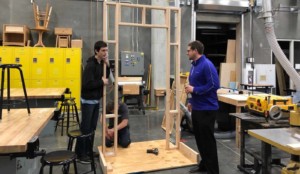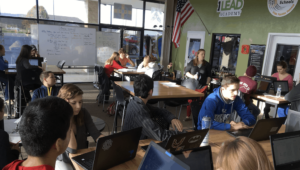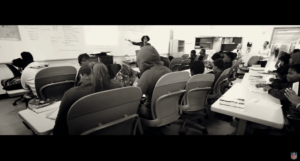The Super Diploma

I was in our front yard the other day when I saw a woman doing her best to jog down the street. Turning the corner behind her was the middle-school bus that had just dropped off kids in our neighborhood and was headed to the next block. As the bus approached the woman, I feared the worst for her. Middle schoolers can be somewhat cruel. Besides that, did I mention they were on a school bus? At the end of the day, those are like mobile versions of Lord of the Flies, but with less rules and more chaos. Sure enough, as the bus approached the woman, three windows came down and heads stuck out. I was already cringing, but to my surprise, the middle schoolers shouted things like “Keep it up!” and “You’re doing great!” and “You got this!” A broad smile swept across the woman’s face. She waved at them and ran with new-found confidence. My smile was bigger than hers.
These Generation Z kids surprise us all the time. They exceed our expectations when our expectations are low (like me, wrongly, above). On the other hand, they also exceed our highest expectations. A particular Gen Z group has emerged as the super achievers, and I don’t mean just in the classroom. They have have launched their own startups and are serious content creators. Take a look at Business Insider’s list of most impressive kids for 2012, and be prepared to say, “Wow!” a lot.
Spectacular, indeed! Did you notice that most of them were from public schools? If public schools are looking to keep their edge or regain it where they lost it, they need to keep those high-end students enrolled by letting them unleash their potential. We need to empower them to pursue their own journey and not be the barrier by forcing them to fit into a model that doesn’t really challenge them or fit their needs.
The Gen Zs don’t realize that the Internet has flattened the world. It’s just their world, and they are mastering it. They have access to an unprecedented amount of knowledge. They network with people from around the world. They create and share content truly like never before, and . . . well, they’re on a roll. And in case there’s any doubt, the Gen Z roll is fueled by the Internet. Students can follow any passion that they have with our without our help. The knowledge, the models, the exemplars, the networks, the funding, the mentoring all can be found online. Gen Zs write books, create comics, make medical breakthroughs, launch startups, create apps, lead causes, and show others how to maximize their lives (life hackers), and if they don’t have an avenue to do this at school, they can do it (and are doing it) on their own after school.
Wouldn’t it be great, though, if they all had the opportunity to do that at school? Wouldn’t it make K-12 way more relevant?
In light of the Gen Z superlative achievements in the Internet Age, it’s time that states consider the idea of a “super diploma.” Diplomas are a benchmark of success, but what they represent state-by-state frequently changes, and that’s fine. Today we have alternative pathways to graduation that better indicate what a student has achieved than we have had in the past, but finding a diploma that truly captures the success of the Gen Zs has not happened yet.
Gen Zs are not simply college and career ready. They’ve gone to college and even have careers. Yes, they will continue their education (maybe not in a traditional sense) and their careers will evolve or change, but to give them a standard diploma or even a college/career-ready diploma is selling their achievements short because they are not just college and career ready, they are future ready. These Gen Zs are literally creating the jobs that don’t exist yet that they then fill themselves. “How do ya like them apples?”
In 2011, nineteen states had honors or college prep degrees. Eleven states had technical degrees. These diplomas, though, measure the success of pre-Internet kids. This new type of teenager needs a new type of diploma. The super diploma isn’t just a merger of the college prep and technical diplomas, but it isn’t revolutionary either. This is just an evolution that better reflects where we are. (By the way, if the Gen Zs haven’t convinced you, wait until you see the Gen Alphas who are following them. Futurists and other nerds predict they will be like Gen Zs on Red Bull with built-in software and hardware enhancements. Seriously.)
The super diploma won’t be earned by simply taking more advanced classes that are coupled with a working internship. The super diploma will be awarded to Gen Zs who are producers, innovators, and creators, which the Internet has empowered them to become. Right now most of them are creating their own individualized learning paths. Time for us to jump in.
There will likely be several pathways to get a super diploma, but certain features should be universal. Here’s where we can start:
Public and Private Backing – Leaders must be vested in the future of super diploma grads. This goes beyond academic scholarships. Some super diploma graduates will pursue non-traditional higher ed routes, but they will almost certainly be job creators or part of the highly valued creative class. Both are essential in a state’s economy.
Selection Committee – The super diploma won’t be earned by simply checking off accomplishments from a list. Think more along the lines of a teacher’s National Board certification. You might not have many super diploma graduates in the first year, but like Field of Dreams, build it and they will come.
Portfolio – Transcripts alone will not reveal which students should earn a super diploma. Too many lifewide ingredients outside of the scope of the traditional school lens are necessary for this distinction. It will take a portfolio to even be considered. Don’t worry, though. Gen Zs have been working on their portfolios since they gained access to the net.
Future Ready – These students have already proven they are college ready and career ready. They have earned high school and college credits from multiple providers. They’ve earned certifications and badges from providers like CodeAcademy, UDACITY, and Reel Works. They are ready for the workforce that has not arrived yet.
Leadership – They’ve demonstrated leadership not just with school organizations, but with civic organizations and private enterprises.
Grand Challenge – They have taken on one of the grand challenges in either a global, national, or local project.
Life Hacker – They have done something to make life better or more productive for others.
Networked – They are already networked. Yes, they have a following and it dwarfs ours.
Raised Money – This is different than earning money. They’ve raised money through crowd-sourcing to finance a project or support a cause.
Incubators – States need to develop incubators for super diploma grads. This is a win-win for a state as the future payoffs are big. Incubators are more than just funding. They give startups business advice, marketing, financial management, finding strategic partners, and so on. Startups that go through the incubator process have twice the chance of staying open. Not all super diploma grads will be launching startups, though. Incubators for technology and content creation should be available, too.
So which state will be the first to offer the super diploma? The good thing is that many of the pieces are in place, and most importantly, the super kids are already doing their stuff.
And by the way, Bus 746 . . . .
Keep it up!
You’re doing great!
You got this!








Tom Vander Ark
Thanks Adam, great post. On NPR Marketplace this am, they said internships are even more important than degrees, so work experiences (& portfolio evidence) certainly belong on your list. http://www.marketplace.org/topics/economy/education/internships-become-new-job-requirement
Adam Renfro
Ahh, thanks for that. It's going to be interesting to see how internships develop.